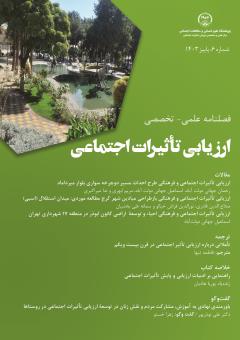باورمندی نهادی به آموزش، مشارکت مردم و نقش زنان در توسعۀ ارزیابی تأثیرات اجتماعی در روستاها (گفتوگو با «دکتر علی نوذرپور»)
محورهای موضوعی :
1 - دانش آموخته دکتری جامعهشناسی فرهنگی، دانشگاه مازندارن
کلید واژه: باورمندی نهادی به آموزش, مشارکت مردم و نقش زنان در توسعۀ ارزیابی تأثیرات اجتماعی در روستاها,
چکیده مقاله :
اگر یکی از راههای دستیابی به توسعۀ پایدار، توسعۀ روستایی، حفظ منابع و سرمایههای طبیعی، بومی و انسانی دانسته شود، ارزیابی تأثیرات اجتماعی میتواند گامی مهم در تسهیل این امر باشد. ارزیابی تأثیرات اجتماعی به عنوان یکی از عناصر شناخت شرایط اجتماعی، فرهنگی، محیطزیستی، اقتصادی و بومی میتواند با مشارکت ساکنان روستاها، امر توسعه را در روستاها تسهیل کند و به توانمندسازی نهادی دهیاریها و روستاها منجر شود. در این شماره برای بررسی نقش و موانع انجام ارزیابی تأثیرات اجتماعی در توسعه و توانمندسازی دهیاریها به سراغ دکتر نوذرپور رفتیم تا از نظرات و تجربههای ایشان استفاده شود. دکتر نوذرپور دارای مدرک کارشناسی جامعهشناسی و کارشناسی ارشد و دکتری شهرسازی است. او فعالیت خود را در وزارت کشور از سال 1370 در حوزه عمران و توسعه شهر و روستا آغاز کرده و تا بازنشستگی نیز در همین حوزه فعالیت داشته است. در مقطعی، مدیر کل دفتر برنامهریزی و عمرانی بوده و مسئولیت کلیه امور شهرداری کل کشور را در حوزه-های برنامهریزی، سیاستگذاری، مطالعات، پژوهش و آموزش، توزیع منابع و پشتیبانی فنی بر عهده داشته است. در یک مقطع نیز مسئولیت راهاندازی دهیاریها را در کشور به عهده داشته و از سال 1382 تا 1384، معاون راهاندازی دهیاریها در سازمان شهرداری بوده است. ایشان پیش از بازنشستگی، سه سال و اندی در سمت شهردار منطقۀ 22 تهران در شهرداری فعالیت داشته است. دکتر نوذرپور، یکی از موانع اجرای ارزیابی تأثیرات اجتماعی و فرهنگی در بخش روستایی را ساختار سیاسی و بینش مدیران نسبت به امر آموزش در بخش روستایی میداند و معتقد است که یکی از مسائل بخش روستایی، نبود اطلاعات کافی نسبت به سرمایههای اجتماعی، بومی، محیط¬زیستی و انسانی است و پیوستهای اجتماعی و فرهنگی میتواند با حمایت مدیران، منجر به شناخت بیشتر روستاها و جلب مشارکت اهالی روستا در امر توسعه شود. در ادامه، گفتوگوی با ایشان را می¬خوانید.
If one of the ways to achieve sustainable development is rural development, preservation of natural, local and human resources and capital, social impact assessment can be an important step in facilitating this. Evaluation of social impacts as one of the elements of knowing the social, cultural, environmental, economic and local conditions can facilitate the development in the villages with the participation of the residents of the villages and lead to the institutional empowerment of the villagers and villages. In this issue, to investigate the role and obstacles of social impact assessment in the development and empowerment of rural people, we went to Dr. Nozarpour to use his opinions and experiences. Dr. Nozarpour has a bachelor's degree in sociology and a master's degree and a doctorate in urban planning. He started his career in the Ministry of Interior in 1370 in the field of urban and rural development and worked in the same field until his retirement. At one point, he was the general manager of the planning and construction office and was responsible for all municipal affairs in the country in the fields of planning, policy making, studies, research and education, distribution of resources and technical support. At one point, he was responsible for the establishment of rural cooperatives in the country, and from 1382 to 1384, he was the deputy for the establishment of rural cooperatives in the municipal organization. Before his retirement, he worked as the mayor of Tehran's 22nd district in the municipality for three years. Dr. Nuzarpour considers the political structure and the managers' vision of education in the rural sector to be one of the obstacles to the implementation of the social and cultural impact assessment in the rural sector, and he believes that one of the problems of the rural sector is the lack of sufficient information about social capital. It is local, environmental, and human, and social and cultural attachments can, with the support of managers, lead to more knowledge of the villages and attract the participation of the villagers in the matter of development. In the following, you will read an interview with him. نماد «مورد تأیید انجمن»
.

